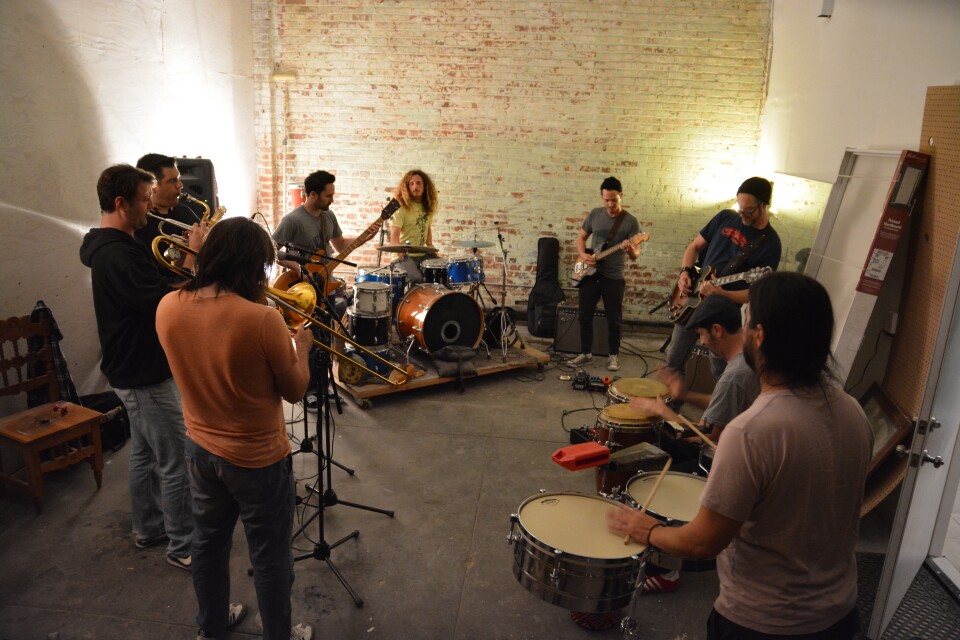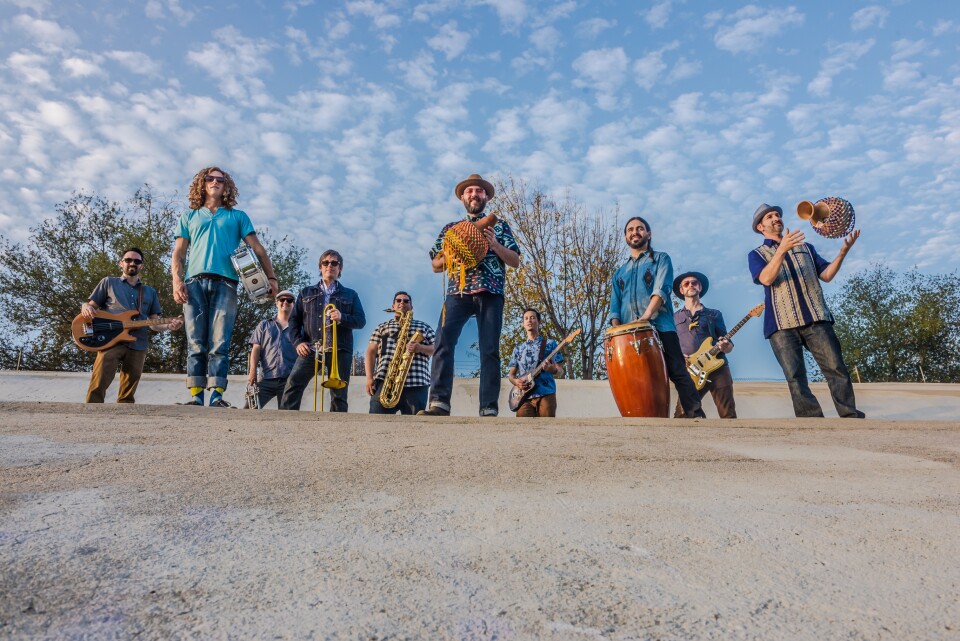Photographer and filmmaker Lauren Greenfield spent years documenting wealth throughout the world. Now her work is featured in a multimedia exhibit titled “Generation Wealth"; We get an update on the Writer’s Guild contract negotiations, which resumed today; With its third album, the L.A. band Jungle Fire is solidifying its tropical funk sound.
Lauren Greenfield's photos might have predicted the rise of Donald Trump
Photographer and filmmaker Lauren Greenfield got her start with National Geographic, documenting the Maya in Mexico. But turning her focus back to her hometown of Los Angeles ignited what's become her life's work — documenting the global obsession with wealth, fame and beauty.
Her acclaimed 2012 documentary, “The Queen of Versailles,” about a Florida couple’s quest to build the largest home in America, was also a morality tale about the housing crisis. Her 2008 film, “kids + money,” examined how young people in L.A. view wealth.
The breadth of Greenfield’s work has now been consolidated into a new multimedia exhibition at the Annenberg Space for Photography and a forthcoming book, both titled “Generation Wealth.”
As Greenfield describes it, "Generation Wealth" is a project about "the aspiration for wealth and how that has become a driving force — and at the same time an increasingly unrealistic goal — for individuals from all classes of society."
The Frame's John Horn recently got a preview tour of "Generation Wealth" with Greenfield at the Annenberg Space for Photography.
Interview highlights:
On the parallels between her exhibition and the brand that Donald Trump created
There are a lot of uncanny overlapping themes and tropes and parts of his character that run through the work. From the aesthetic of luxury, the kind of grandiose architecture, being a real-estate mogul and real estate being kind of at the center of this project, and tracking the boom and the bust as kind of an allegory. But also the fact that Donald Trump owned beauty pageants, the commodification of women — there are so many kind of intersecting themes. Of course I had no idea that he would be elected, but it's true that now, when you look back through the work, the writing's kind of on the wall.
On the definition of "wealth" in the "Generation Wealth" project
It's definitely not limited to material possessions. It's really about wealth, broadly interpreted. I'm looking at the currency of the body, the currency of sexuality, the currency of youth, the currency of celebrity, the currency of fame ... it's really about status and "being somebody," and what success means in the new American Dream.
On how her high school experience in L.A. influenced the trajectory of her career
Part of this is because, in 10th grade, I spent a year living in France. I was a paying boarder with an aristocratic family and learned for the first time that you could have nobility and class without money in other cultures. And when I got back, I really saw that L.A. was a place where social class and stature was purely defined by money. And so that was something I kind of wanted to come back and look at when I became a photographer. I actually studied visual anthropology in college and started at National Geographic, so my first assignment was with the Maya in Mexico. And as I was really struggling with access there, and really struggling to understand a foreign culture, I kind of said to myself, Who am I to tell their story? Maybe I should go back to a culture that I know. And maybe that culture that I had seen at that point — depicted on shows like "Beverly Hills 90210," and looked up to internationally — I thought maybe that culture is actually worthy of that same kind of study that we bring to other cultures.
To hear the full interview with Lauren Greenfield, click the blue player above.
The LA band Jungle Fire lays down some tropical funk
The band, Jungle Fire, draws influences from a wide array of music icons: James Brown to Fela Kuti; Irakere to War. In their second album, called “Jambú,” they establish an original sound the band calls “Tropi-Funk.”
On a recent evening at the group's studio and rehearsal space, on Pico Boulevard near Vermont, the ten-piece band forms a circle and starts its monthly ritual.
Various members explain the band’s sound and purpose: “It’s been described as a ten piece Tropi-funk juggernaut from the City of Angels … I think Jungle Fire is just kind of a melt-your-face, audio-slap-to-the-face’ party band … It’s a party, it’s love, it’s forget about everything else and just let yourself loose and bring it all together.”

Jungle Fire came together as a jam between friends six years ago. Bass player Joey Reina says a friend called him and said he needed a band for a music festival he was organizing: “And ever since then, it just started to gain popularity and people liked it and became more serious. We got the core members of the band, kind of figured out, and it became what it is today.”
Jungle Fire plays a wide range of related music styles. They can lay down a groove of deep funk. They can re-invent Latin America’s most popular dance music, in a tune called “Cumbia de Sal.” And tip their hat to a major figure of West African music in the tune “L.A. Kossa” — a reference to Manu Dibango’s “Soul Makossa.”
Steve Haney is one of three percussionists — the foundation of the Jungle Fire sound. He says the band re-creates Colombian funk sounds from the 1970s: “We gravitated towards that because that’s how we heard the sound of the group going. And we wanted to bring some flavors of L.A., Southern California, obviously War — that’s a big part of what we listened to, as a lot of us were born in the '70s.
Guitarist Patrick Bailey says Jungle Fire is a musical reflection of the L.A. metropolitan area: “C’mon, it’s 2017! It’s such an amazing cauldron of so many cultures, it just gets more and more diverse and I think this band is definitely, definitely a product of that. We don’t sit down and think about what sound we’re going to do, We’re gonna do Afrobeat, we’re gonna combine this Colombian rhythm. The beautiful thing about this band is it just kind of happens.”

Percussionist Alberto López says the group's debut album was like a first date for the band — a musical explosion of friendship among the members: “But then we had a couple years of playing together and touring together between the first and the second record, and I think that shows. The second record showcases experiences that we could have not have imagined when we first got together.”
Haney says anytime the band plays a show, they want to make sure people have a good time: “Letting them forget at that moment, forget about all this B.S. that’s happening, because there’s so much evil that seems to be opening up everyday.”
And if the fans like the music, and take it home and share it with their friends and family, Jungle Fire is doing their part for a better world.
Potential strike looms as negotiations resume between WGA and studios
Negotiations are back on between the Writers Guild of America and the Alliance of Motion Picture and Television Producers, but the two sides are running awfully close against an upcoming deadline.
The two groups have until May 1 to come to a new contract agreement, but the WGA has already announced it will conduct a strike authorization vote this Friday. So even as the two sides resume their negotiations, it's unclear if there's enough time to find an agreement that appeals to both the WGA and the studios.
Joining John Horn to unpack this complicated issue is Jonathan Handel. He's an entertainment and technology lawyer at TroyGould, as well as a contributing editor at The Hollywood Reporter.
Interview Highlights
What's the latest for the WGA and the studio alliance?
They are sitting down for five days this week, and afterwards there's going to be a strike authorization vote, so things are moving potentially in that direction. My research has determined that the writers are asking for demands that are three times as much as what the studios are likely to agree with.
So where are the Writers Guild and the Alliance of Motion Picture and Television Producers farthest apart, and where are they maybe closest together?
They're closest together in that the Writers Guild wants the same basic wage increases — three percent a year, essentially — that the Directors Guild got in their deal several months ago. And they want enhancements in the new media residuals — Netflix and Hulu and things like that — that again the Directors Guild got.
Those are probably on the table from the studios at this point, but the trouble is that the Writers Guild wants a lot more. Let's make sure that their side of the story is out here: their feeling is that the studios have made an operating profit of $51 billion across a handful of companies, so what they want — $180 million a year for each of the next three years — is less than a third of one percent of that.
They have reasons why they want the things they want, given what's happening with incomes and health plans and so forth. But the trouble is that the studios are most likely at a number that's around $180 million over the next three years, not $180 million per year for three years.
The current WGA contract expires at the beginning of May, so less than a month from now. What is the Guild saying about what might happen if there's no deal by then? Could writers keep working without a contract as negotiations continue, or is that a drop-dead date?
They could legally, but the WGA leaders are saying that it'll be a drop-dead date. If there's no contract in place May 1, they'll be on strike on May 2.
This is a hypothetical, but if there is a strike, what are the TV networks, streaming sites and movie studios doing now to prepare for that? What are the first places that would feel the effects of a strike?
Well, it's not clear exactly what they're doing to prepare. Unlike 10 years ago, the Writers Guild didn't telegraph terribly far in advance that this move was potentially coming. In terms of who would see it first, probably the same order as that strike 10 years ago — the late-night shows, which are written on a day-to-day basis, then the soap operas and sitcoms.
What you start to get to is the question of whether the fall season will be impaired or delayed or otherwise affected, because the writing and development for the fall broadcast season starts in relatively early summer.
So if a strike goes past roughly mid-June or so, you start to look at the possibility of affecting that season, and that takes money out of the mouths of show-runners — the writer-producers who head up these shows. Those show-runners are the ones who ended the 1988 strike, and my understanding from sources is that they played a key role in ending the strike 10 years ago as well.
As is often the case in any labor negotiation, there's a lot of threats of walking out or walking away from the bargaining table. But given where the Guild and the Alliance are now, would you say you're more optimistic or more pessimistic than you were maybe a week or so ago about the possibility of a strike?
It really felt a little bit like election night, quite frankly — my needle was on one side of the equation a few weeks ago, and it's sort of jiggered its way over to the other side. I mean, you're talking about a $350 million gap between the two sides, so I don't think they're going to bridge that gap this week.
And next week you'll see a strike authorization vote and so forth, and that vote ends on the 24th, just a week or less before May 1. That's enough time for a few more days of negotiation, but I think that will probably produce a last-offer from the studios that the writers will turn their backs on. I think we're probably looking at a strike.




